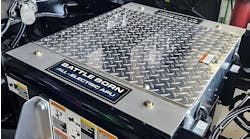The passage of the American Clean Energy and Security Act (H.R. 2454) by the House Energy and Commerce Committee late last week is being heralded as a victory by some groups and a disaster by others. Among the most controversial of its provisions is a mandatory cap and trade system for carbon dioxide.
The Coalition for Green Bank, a consortium of more than 60 leaders in energy development enterprises, including renewable resource developers, investors and financial advisors, issued a formal message of congratulations to the committee on May 22. The organization, which is dedicated to "unleashing a new era of private investment in green energy," referenced in particular the provision of the Act which would establish a Clean Energy Deployment Administration to promote affordable financing for clean energy and energy-efficient technologies.
"Not only is this a huge victory for legislative leaders…but for the business and environmental leaders across the United States stymied by the effects of the lending crisis on financing renewable projects…" said Todd Filsinger, co-chair of the Coalition for Green Bank and head of PA consulting Group's Energy Capital Markets practice.
The American Legislative Council (ALEC), on the other hand, was equally quick to condemn the House Energy and Commerce Committee for furthering legislation that will "raise energy prices on American consumers, will cause job losses and will put the United States at a competitive disadvantage in the global economy. H.R. 2454 imposes for the first time in the U.S. a cap and trade system for carbon dioxide that promises to vastly expand power in Washington and to plague America's economy with fraud, waste and efficiency."
ALEC (www.alec.org ), which is a nonpartisan, individual membership organization of state legislators, also criticized H.R. 2454 for putting an unfair mandate on states, which have already been developing their own policies on renewable energy. "And let us remember that reducing CO2 emissions is no end in itself," said Alan Smith, ALEC's executive director. "At the end of this exercise in self-impoverishment, we may find we have produced no environmental benefit whatsoever."
The U.S. Conference of Mayors (www.usmayors.org) straddled the fence by issuing a statement of commendation to the members of the committee for "moving a step closer towards establishing a first-ever Cap and Trade system in the United States," but voiced their concern over the lack of direct funding for cities. They recommended that at least 20% of the dollars expected to flow to states "go instead directly to cities to support efforts already underway by nearly 1,000 mayors."
The U.S. Climate Action Partnership (USCAP)-- which counts companies such as Alcoa, Caterpillar, Chrysler, DuPont and Shell among its members along with organizations like the Nature Conservancy--- likewise issued a cool congratulatory statement on the passage of H.R. 2454 by the committee, but made it clear that they viewed the current measure as a starting point only (www.us-cap.org). "As this process unfolds, we are committed to pursuing further opportunities to make the bill even more effective and economically sustainable," they noted. "We are committed to a path forward that will reduce greenhouse gas emissions, protect consumers and advance new technologies that will lead to a low carbon economy."
The American Clean Energy and Security Act (http://energycommerce.house.gov) includes four separate titles or sections: A clean energy title, an energy efficiency title, a global warming title and a "transitioning" title designed to protect U.S. consumers and industry and create green jobs during the transition to a clean energy economy.


